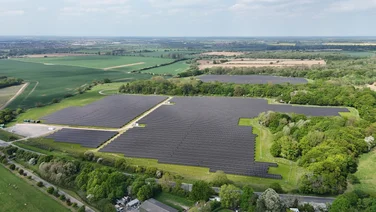- The average UK energy bill will be £1,738 from with the current Energy Price Cap
- Energy prices are unlikely to ever drop to pre-pandemic levels
- UK energy prices are likely to fall slower than in Europe
Soaring energy bills have been on the minds of people across the country, and no doubt many are wondering when — or if — energy prices will go down.
We’ve answered that question, as well as investigating why prices climbed so high in the first place, and whether energy prices could climb again in the future.

What is the average energy bill in the UK?
The average household in the UK has an annual energy bill of £1,738, as of January 2025. This is because the Energy Price Cap (EPC), Ofgem’s mechanism to control the amount families pay for energy, was increased from £1,717 on January 1st.
Ofgem changes this figure every three months and is set to do so on April 1st 2025, and most industry analysts expect it to increase again.
This fact alone means it is extremely unlikely that the price of energy will come down at least in the short term.
Why are energy prices so high?
Energy prices are high because of multiple factors.
First, as COVID-19 lockdowns ended, prices for gas and electricity climbed as countries suddenly needed more energy.
Then came the double whammy of Russia’s war of aggression against Ukraine, which interrupted the flow of gas into Europe and meant European countries had to pay more from other sources.
Global demand for liquefied natural gas (LNG) hasn’t helped either.Europe has struggled to fill its storage, and although LNG doesn’t make up the bulk of the UK’s gas usage, it’s still essential.
And despite the UK importing just 4% of its gas from Russia prior to the war, it remains reliant on imports. More than 50% of the UK’s gas is imported, so when global gas prices go up, the UK pays more.
Our article covering the reasons for gas price increases has more information. We recommend you also check out our article about where the world will buy gas from after Russia.

Will energy prices ever drop to pre-pandemic levels?
Energy prices are unlikely to ever drop to pre-pandemic levels. Just ask industry figures like Anders Opedal, boss of energy company Equinor, who recently said energy bills will remain above pre-pandemic prices indefinitely.
If they do, it won’t be until 2030 at the earliest, so it’s better to leave pre-pandemic prices in the past.
Even if the pandemic had never happened, or if there wasn’t an increased demand for energy after the pandemic, energy prices have still been on an upwards trajectory for decades.
However, the post-pandemic increase has been stratospheric. Ofgem increased the price cap to £1,277 in October 2021 — by January 2023, it rose to £4,279, though fortunately the EPG capped it at £2,500.
Will energy prices in the UK drop more slowly than in Europe?
We can’t reliably say energy prices in the UK will drop more slowly than in Europe — but prices in the UK did rise much faster than in the rest of Europe.
This is especially true of France, who in 2022 capped electricity price increases to 4%, which has helped keep French bills among the lowest in Europe.
The UK saw the cost of electricity increase by 65.4% in comparison, and bills for electricity and gas are set to increase by another 43% in April 2023.
Household electricity prices in the UK rose faster and higher than any other country in Europe. Even Germany, where electricity generation was hit hard by the interrupted flow of Russian gas, experienced less of a rapid price rise than the UK.
So using the evidence of faster prices in the UK compared to Europe, it’s reasonable to assume prices will drop more slowly.
The reasons energy prices might fall
The good news is that energy prices are lower than they were a little while ago. For example, the average energy bill in September 2023 was £2,074, significantly higher than today.
We’ve broken down the main reasons energy prices are going down below.
Warm winters
The UK has experienced a series of ‘warm’ winters, with 2024 the fourth warmest on record behind 2022, 2023 and 2014.
On top of that, the Met Office believes that 2025 be warm as well and could challenge previous temperature records.
As well as that, demand for gas has fallen as well as the UK becomes less dependent on fossil fuels.
In the third quarter of 2024, the UK’s dependency on fossil fuels fell by 3.5% year-on-year and demand for natural gas fell by 7.5% in the same timeframe to record levels.
Another factor that could affect energy bills either way is China’s liquified natural gas (LNG).
China is one of the world’s biggest importer of LNG, along with the EU, and when its demand dipped in 2022, this eased pressure on households in Europe and the UK as there was more to buy.
This also helped the EU and UK reduce its dependency on importing gas from Russia.
However, China is hungry for LNG again, which could mean there is less of it for EU and UK consumers.
Could energy prices go up in the future?
Yes, they absolutely could, because that’s the reality of a grid still heavily reliant on fossil fuels for both electricity and gas.
On the other hand, a 100% renewable UK would no longer be subject to the price fluctuations of fossil fuels. The UK wouldn’t need to worry about the cost of gas exported from another country if it was capable of making its own green hydrogen, for example.
In either case, expanding green technology such as solar panel farms and wind farms (particularly onshore wind farms), would help keep energy prices down.
The UK would need to spend just 4.4% of its total GDP to create an entirely green energy mix by 2030.
Doing so would hurt the profits of energy companies such as Shell and BP of course, which will no doubt continue to push back promises of reducing emissions as far as they can.
Summary
The extreme energy price rises experienced by the UK in the months after the pandemic and during Russia’s war against Ukraine have been difficult.
It’s encouraging to see that prices are predicted to fall, albeit slowly and at a pace that still leaves millions of UK households in fuel poverty.
There’s plenty of room for improvement. 76% of Brits say the government’s fallen short when it comes to supporting them with energy bills.
Unfortunately, the government appears reluctant to further increase the windfall tax on energy companies that continue to post record profits.
The most effective way to keep such dramatic price rises from happening in the future is to switch to more renewable energy sources — and quickly. It’s the only way the UK can truly be in control of its own energy destiny.







